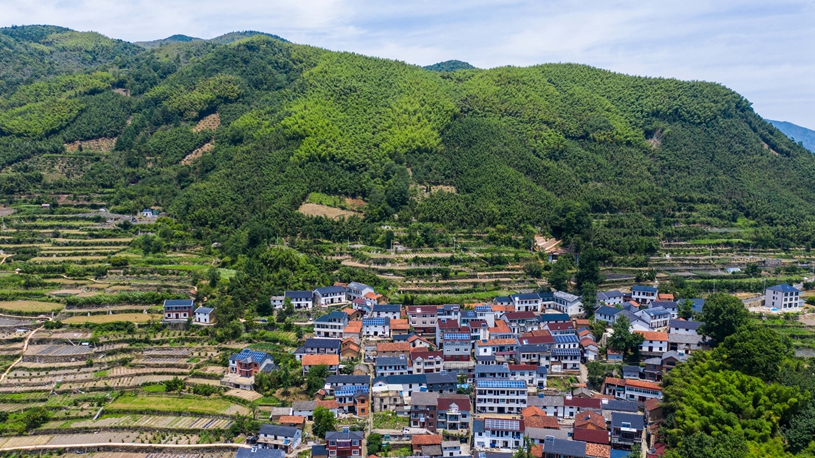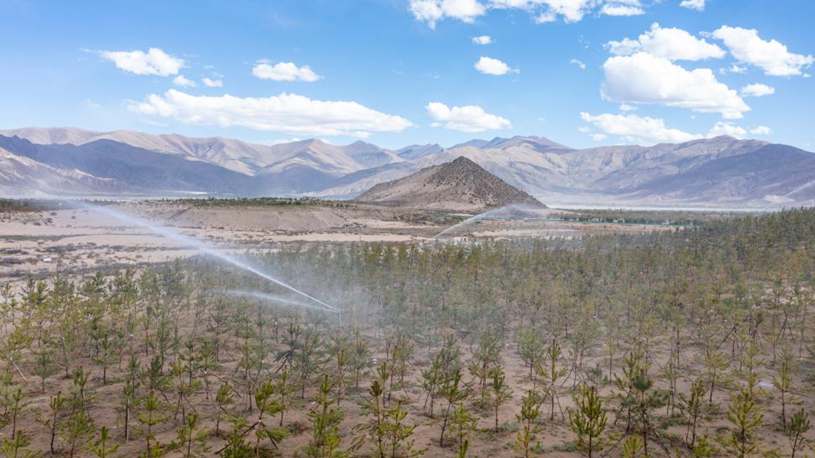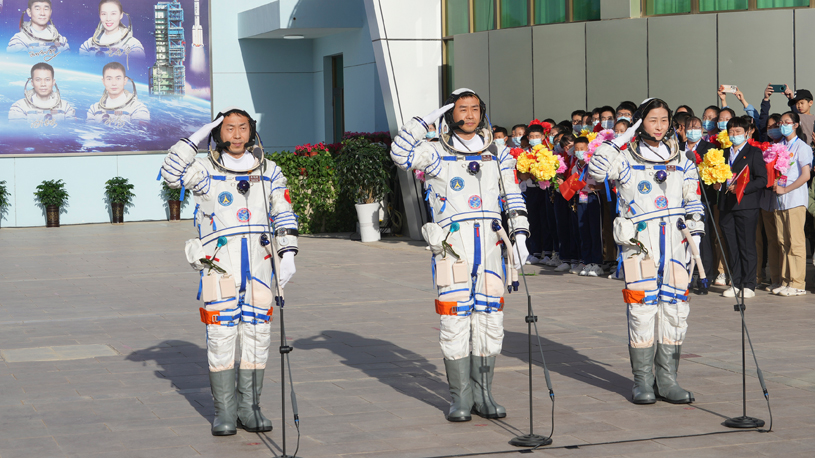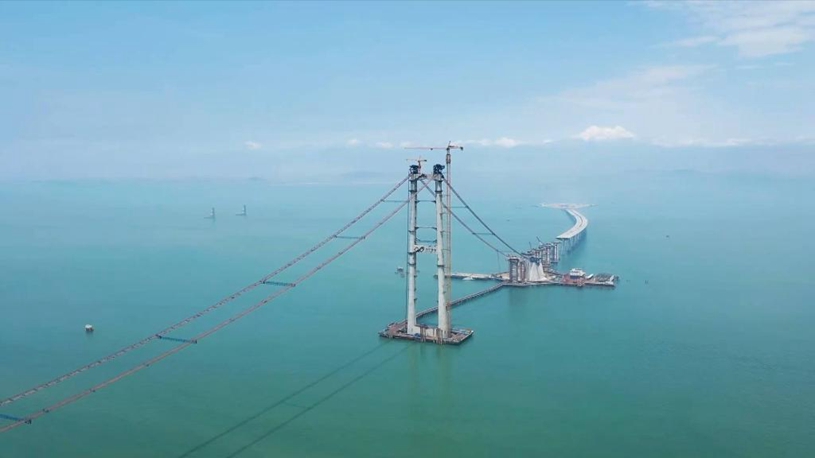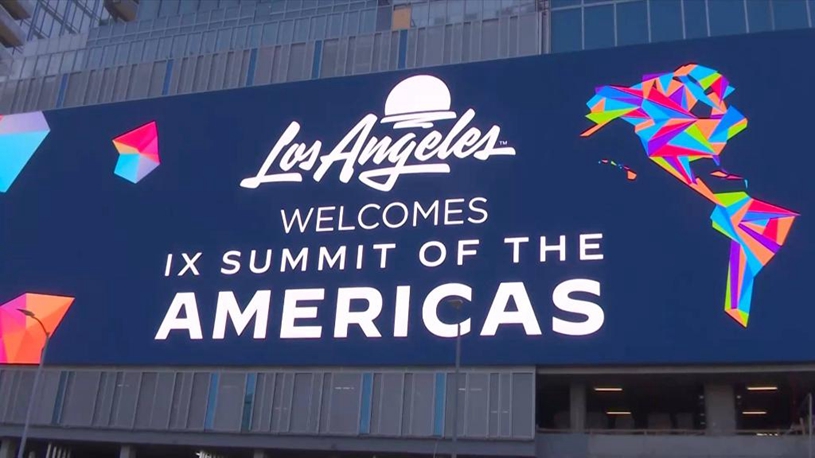* The 9th Summit of the Americas has become a diplomatic nightmare for the United States, which opted to scratch Cuba, Venezuela and Nicaragua off the guest list of the continental conference.
* The summit fails to help resolve the region's pressing problems due to the lack of political will on the part of the United States, said analysts.
* Washington seems to take advantage of the summit to restore its waning influence and tighten its grip over Latin American nations.
MEXICO CITY, June 10 (Xinhua) -- This week's Summit of the Americas, being held in the U.S. city of Los Angeles, has become a diplomatic nightmare for the United States, which opted to scratch three nations off the guest list, essentially gutting the regional gathering even before it began.
U.S. President Joe Biden's administration excluded Cuba, Venezuela and Nicaragua from the continental conference held from Wednesday to Friday despite the objections of other leaders, notably Mexican President Andres Manuel Lopez Obrador, who openly urged the White House to rethink its unpopular position and ultimately declined to attend the meeting in protest.
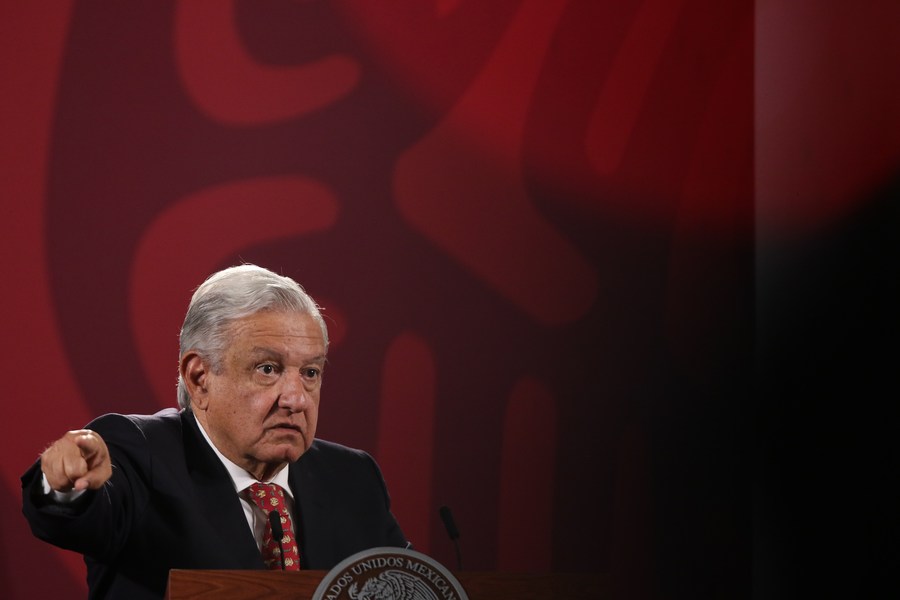
Mexican President Andres Manuel Lopez Obrador reacts during his morning press conference at the National Palace in Mexico City, capital of Mexico, June 6, 2022. (Photo by Francisco Canedo/Xinhua)
Washington's decision to cherry-pick who gets invited to the summit, and strong-arm other governments into acquiescing, sent a familiar chill through Latin America, a region the United States has notoriously referred to as its "backyard."
Far from signalling a willingness to partner with regional countries to tackle common issues, Washington seems to take advantage of the summit to restore its waning influence and tighten its grip over Latin American nations, which are increasingly wary of U.S. self-interest.
EXCLUSION, ALIENATION
If the United States had any hope of casting itself as a regional leader by playing host, the hope evaporated quickly as "exclusion" became the summit's byword. Closing the door to the above mentioned three countries not only angered them, but also alienated the rest.
"There is not a single reason that justifies the undemocratic and arbitrary exclusion of any country in the hemisphere from that continental event," the Cuban government said in a statement. "What our region demands is cooperation, not exclusion; solidarity, not pettiness; respect, not arrogance; sovereignty and self-determination, not subordination."
The move backfired for Washington as countries rallied around the Caribbean nation and condemned U.S. foreign policy towards the island, Havana said.
"The United States underestimated the support for Cuba in the region, while trying to impose its unilateral and universally rejected policy of hostility towards Cuba, as if it were a consensual position in the hemisphere."
Mexico denounced the exclusion as it exposed Washington's double standards on democracy. On Thursday, Lopez Obrador told reporters that the U.S. hegemonic policy "is an anachronistic, old and unfair policy that must be set aside, and a new stage must be inaugurated in the relationship of all the fraternal peoples and countries of the American continent."
In a column published in the Mexican daily Excelsior, Mexican Foreign Affairs Minister Marcelo Ebrard, who led Mexico's delegation to the summit, wrote that Washington accuses countries of being undemocratic -- the reason the White House gave for not inviting the three countries -- only when it benefits U.S. interests.
"It is not applied equally in all cases, but only in some, when it is convenient," said Ebrard, adding that at the forum, Mexico will press for an end to the "inhumane" decades-old U.S. trade embargo against Cuba.
"No country has the right to tell another how to govern itself. The foundation for a new stage in the Americas is mutual respect. It is what we are championing and will champion," Ebrard added.
FAILED POLICIES
The summit fails to help resolve the region's pressing problems, such as mass immigration, arms trafficking, and weak public healthcare, due to the lack of political will on the part of the United States, said analysts.
Washington aims to strengthen its schemes to contain would-be migrants in their countries of origin or countries of transit, without investing what is needed to reduce poverty, the driving factor behind mass migration, Mexican political scientist Eduardo Roldan said.
The phenomenon of migrant caravans "is not going to be resolved because its causes are not being addressed," said Roldan, a former diplomat.
Mexican academic Rodolfo Casillas agreed with the view, noting that a regional pact on immigration the United States aims to reach at the summit only focuses on containment, not poverty reduction.
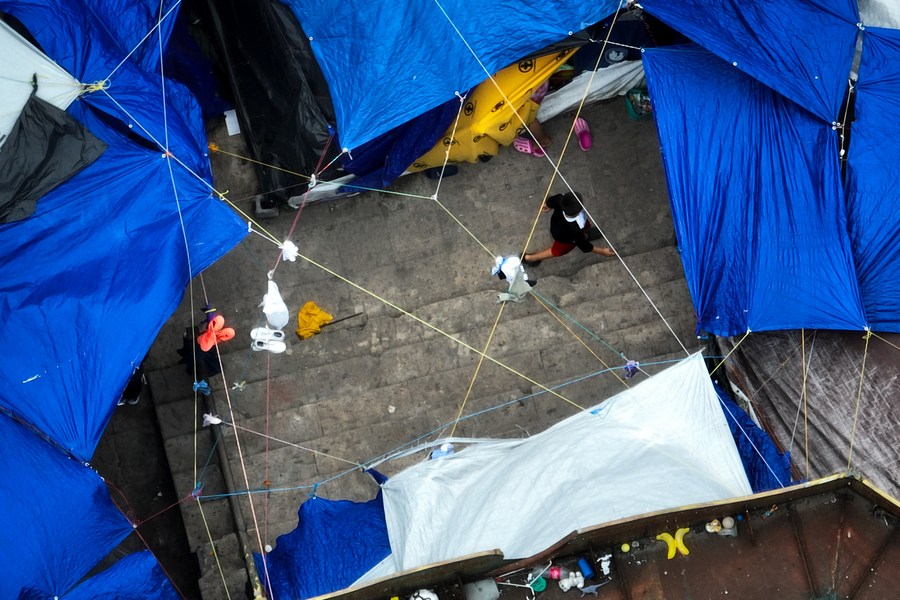
Aerial photo taken on May 2, 2022 shows a migrant walking through tents at a migrant camp in Reynosa, Tamaulipas, Mexico. (Xinhua/Xin Yuewei)
Effective immigration control requires "major investment," the researcher and professor at the Latin American Faculty of Social Science told Xinhua recently.
But so far, the amounts offered by U.S. cooperation programs through its Agency for International Development are "laughable," Casillas said, adding that this cooperation comes at a high cost of job creation and consumption, because the recipient countries have to spend the funds "to buy American products" and hire "American directors and evaluators."
Roldan said that stemming the flow of weapons across the border will also prove elusive because the U.S. National Rifle Association, "the most powerful lobby group in American politics," sways policy by bankrolling U.S. lawmakers' election and reelection campaigns.
"Neither the Republicans nor the Democrats want to confront it as that lobby often contributes to the campaigns of candidates for representatives, senators and president, so the only thing left to do is confront arms trafficking in other countries, as Mexico is seriously doing," Roldan said.
In August 2021, Mexico's government filed a lawsuit at a U.S. federal court against eight U.S. arms manufacturers and distributors, accusing them of engaging in negligent and illicit practices that abet arms smuggling.
Mexican authorities estimate that at least half a million weapons flow illegally each year from the United States into the hands of criminals south of the border, fueling armed violence.
Roldan believes pandemic preparedness may also be glossed over during the summit, given that the United States handled the epidemic "terribly" at home, and sat on the sidelines when Latin American countries were battling with their own outbreaks.
WANING INFLUENCE
The summit was doomed to failure from the very beginning, Cuban senior political expert Rafael Hernandez told Xinhua.
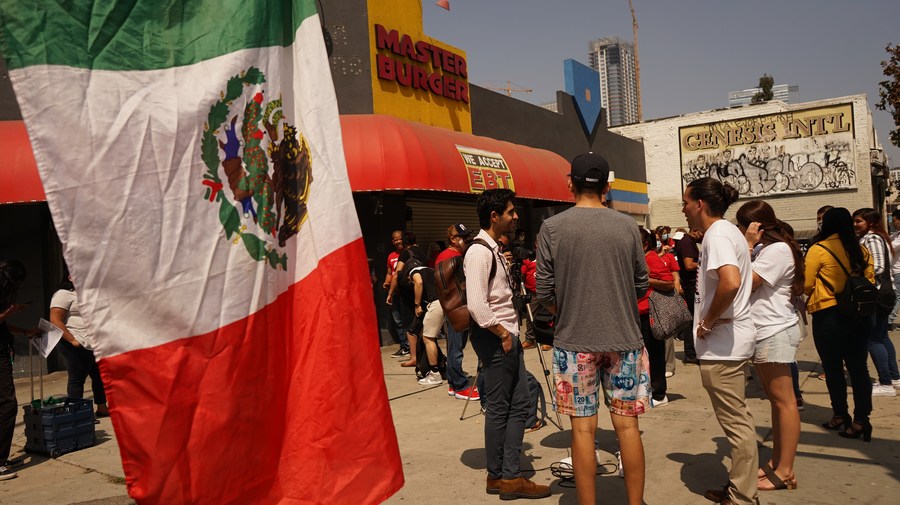
Protestors attend a rally near the Los Angeles Convention Center where the ninth Summit of the Americas is held in Los Angeles, the United States, June 8, 2022. (Photo by Zeng Hui/Xinhua)
Instead of appealing to dialogue and engagement, he said, the U.S. government continues to impose its views on the region through unilateral sanctions, punitive measures and intervention.
"The exclusion of Cuba, Nicaragua, and Venezuela from the list of invited countries to the summit has been counterproductive for U.S. foreign policy, which uses coercion as a tool of political pressure," said Hernandez.
Diego Sequera, a Venezuelan journalist and political analyst, believes Washington's main objective is to use the summit to ensure economic, commercial and geopolitical control in the region.
However, that goal "has been increasingly undermined" by a "fractured and devalued" summit that fails to represent the Americas, Sequera said.
While Latin America has changed and is no longer the U.S. backyard, Washington's policy towards Latin America has not yet changed, said observers.
"They act as the arbiters of what democracy, human rights and freedom are. That is not a basis for engagement in a dialogue in the western hemisphere, which is politically speaking more diverse than ever," Hernandez said.
The U.S. government does not promote multilateralism and international cooperation, but narrowly defines democracy, whereas others understand it to be about participation, pluralism and diversity, Hernandez added.
Little wonder Washington's influence in the Latin American and Caribbean political arena has waned over the past decade.
That means the United States has lost its leadership role in the region, which in turn limits the real scope or importance of the Summit of the Americas, Roldan said.
"We live in a different world ... There are new institutions, new rules and that is what we are experiencing today," said Roldan. "The United States is going to have to understand that it neglected Latin America and we are not its backyard. Latin America is giving itself respect." (Video reporters: Hu Yousong, Sun Ding, Yan Liang, Yu Lizhen,Kang Wenjun, Wu Hao, Zhu Yubo, Lin Chaohui, Xu Ye, Wang Ying, Liao Siwei; video editors: Ma Ruxuan, Zhu Cong, Mu Xuyao, Yin Le)■

